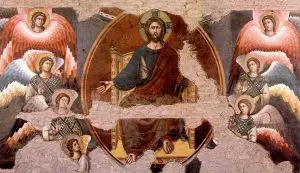In agony, Jesus fervently pleaded with God to the point that his sweat became like drops of blood.[1] Nevertheless, he offered a prayer of submission:
Luke 22:41-42 (NASB) And He withdrew from them about a stone’s throw, and He knelt down and began to pray, saying, “Father, if You are willing, remove this cup from Me; yet not My will, but Yours be done.” (emphasis added)
Jesus did not want to die. His will was to live. But God’s will prevailed.
Not my will, but Yours be done

The Garden of Gethsemane narrative is so familiar that we fail to realize the ramifications of Jesus’ statement. “Not my will, but Yours be done” means that Jesus and God the Father had two different wills. Let that sink in. What God desired, Jesus did not. These opposing wills present quite the problem for the doctrine of the Trinity. If Jesus is God, how can he have a will that is contrary to God’s? In other words, if God the Son and God the Father are one essence, as orthodoxy states, how can they have differing desires? If they are truly “one” as Trinitarians profess, how can they have divided wills?
The Garden of Gethsemane isn’t the only time Jesus deferred to the will of the Father. Their relationship is characterized by Jesus’ continual submission:
John 5:30 (NASB) “I can do nothing on My own initiative. As I hear, I judge; and My judgment is just, because I do not seek My own will, but the will of Him who sent Me. (emphasis added)
If Jesus is God we would expect that his will would be the same as the will of the God who sent him. But in this passage there is a clear distinction between the two.
Jesus’ very mission in life was to do, not his will, but the will of God.
John 6:37-38 (NASB) “All that the Father gives Me will come to Me, and the one who comes to Me I will certainly not cast out. 38 “For I have come down from heaven, not to do My own will, but the will of Him who sent Me. (emphasis added)
The author of Hebrews makes the same point: the Messiah came to do God’s will:[2]
Hebrews 10:7 (NASB) “Then I said, ‘Behold, I have come (in the scroll of the book it is written of me) to do your will, O God.'” (emphasis added)
Jesus expresses this truth in yet another way. As the agent of God, Jesus‘ sustenance was to do his Father’s will and to accomplish His work.
John 4:31-34 (NASB) Meanwhile the disciples were urging Him, saying, “Rabbi, eat.” 32 But He said to them, “I have food to eat that you do not know about.” 33 So the disciples were saying to one another, “No one brought Him anything to eat, did he?” 34 Jesus *said to them, “My food is to do the will of Him who sent Me and to accomplish His work. (emphasis added)

Notice that Jesus did not say “our will” or “our work” as we would expect him to say if he was a member of a triune God. Also note that Jesus didn’t send himself, but was sent by someone else. If Jesus is God, wouldn’t he come of his own accord?
With regard to salvation, Jesus spoke of it in terms of being his Father’s will:
John 6:40 (NASB) “For this is the will of My Father, that everyone who beholds the Son and believes in Him will have eternal life, and I Myself will raise him up on the last day.”[3] (emphasis added)
Moreover, the entrance into the kingdom comes from obedience to the Father’s will. No mention of Jesus’ will or that of the Holy Spirit:
Matthew 7:21 (NASB) “Not everyone who says to Me, ‘Lord, Lord,’ will enter the kingdom of heaven, but he who does the will of My Father who is in heaven will enter. (emphasis added)
In addition, we are considered to be Jesus’ “family” if we do the will, not of the Trinity, but of the Father:
Matthew 12:50 (NASB) “For whoever does the will of My Father who is in heaven, he is My brother and sister and mother.” (emphasis added)
The salvation of children is said to be the will of God the Father. Not that Jesus doesn’t desire it as well, but he credits the Father with the desire:
Matthew 18:14 (NASB) “So it is not the will of your Father who is in heaven that one of these little ones perish. (emphasis added)
Even the apostle Paul framed salvation as being the will of God, who is the Father: [4]
Galatians 1:3-5 (NASB) Grace to you and peace from God our Father and the Lord Jesus Christ, 4 who gave Himself for our sins so that He might rescue us from this present evil age, according to the will of our God and Father, 5 to whom be the glory forevermore. Amen. (emphasis added)
 Some may reason that Jesus’ will differed from that of God’s while he was in his so called human state, walking in his human nature. The problem with this theory is that it is not substantiated by Scripture. We are never told that Jesus has two natures or two wills. Even a popular Trinitarian apologist concedes this point:
Some may reason that Jesus’ will differed from that of God’s while he was in his so called human state, walking in his human nature. The problem with this theory is that it is not substantiated by Scripture. We are never told that Jesus has two natures or two wills. Even a popular Trinitarian apologist concedes this point:
The Bible does not explicitly address the question of whether Jesus Christ has two natures or only one.[5] (emphasis added)
The reason the Bible doesn’t address it is because the concept of Jesus’ so called dual natures (hypostatic union) was not developed until fourth century. Furthermore, it was not declared “orthodoxy” by the Church Fathers until the fifth century.[6] The theory was a result of Church Fathers’ efforts to resolve problems that arose when Jesus was thought to be both God and man. Problems such as: if Jesus is God, why does he have a different will from God the Father? How could Jesus die if God is immortal? How can Jesus be God if he doesn’t know the time of his second coming? And so forth. Their solution to this conundrum? Jesus must have dual natures despite the fact that the Bible never teaches this.
The better answer, and the Biblical one, as to why Jesus’ will differs from that of God’s is because Jesus is not God. Rather, he is the human Messiah sent by God to redeem a fallen world:
Acts 2:22-24 (NASB) “Men of Israel, listen to these words: Jesus the Nazarene, a man attested to you by God with miracles and wonders and signs which God performed through Him in your midst, just as you yourselves know— 23 this Man, delivered over by the predetermined plan and foreknowledge of God, you nailed to a cross by the hands of godless men and put Him to death. 24 “But God raised Him up again, putting an end to the agony of death, since it was impossible for Him to be held in its power.
This is the consistent message throughout Scripture and it demonstrates the beauty and wonder of Jesus’ sacrifice. He denied his own desires and humbly submitted to the will of his God and Father. For this reason, God exalted him to His right hand and gave him the highest name. One day every knee will bow and tongue confess that Jesus Christ is Lord,[7] to the glory of God the Father.[8]
[2] The author of Hebrews quotes Psalm 40:6-8.
[3] God granted Jesus the ability to resurrect the dead – John 5:26-27, etc.
[4] God is the Father: John 8:41; 8:54; 1 Cor. 8:6, etc.
[5] “Does Jesus Have Two Natures?” Got Questions.org, accessed 6-27-19
[6] Council of Chalcedon, 451 AD.
[7] God made Jesus both Lord and Christ – Acts 2:36.
[8] Philippians 2:9-11.




Pingback: Does Jesus' Superiority to Angels Prove He is God? An Examination of Hebrews 1:4-14 - One God Worship
This is really good, you concentrate on how Jesus will is not the same as God’s will to refute the trinity. thanks! But do you have any writings about what is God’s will in the lives of His followers, is His will usually involves many sufferings and pains like the end life of Jesus due to being in this world but not of the world, can we live abundantly in all aspects in this age? i think your articles are not focusing on this topic, but if you have time i am hoping to get some insights from you since have big amount of knowledge of scriptures. thanks and God bless you!
Appreciate you reading and commenting on the psot.
As for your question, I do not have any articles that specifically address suffering and the will of God. There are, however, numerous Scriptures instructing believers on suffering as it is a part of this present life. Jesus overcame suffering in this world. We are to look to him as our example so that we too may overcome.
John 16:33 These things I have spoken to you so that in Me you may have peace. In the world you have tribulation, but take courage; I have overcome the world.”